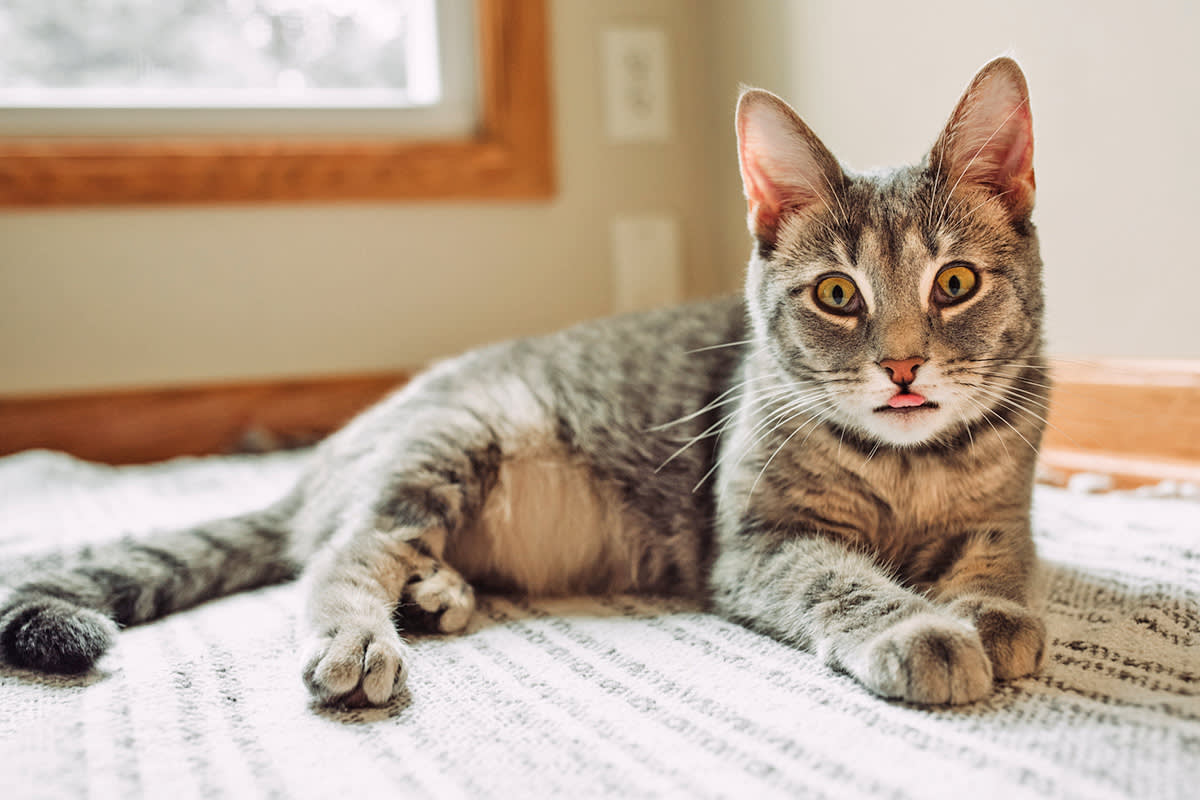What Is “Mlemming” and Why Do Dogs and Cats Do It?
It may give you insight into your pet's health and wellbeing.

Share Article
“Mlem, mlem, mlem.” Hear that?
“Mlem, mlem, mlem.”
There it is again. What is that? What is mlem?
If you’re unfamiliar with the sound/term mlem, don’t worry. Neither were any of the highly experienced pet behavior experts we asked about it. “I’m honestly not sure,” says Joey Lusvardi, certified cat behavior consultant at Class Act Catsopens in new tab.

“What is it?” asks Jessica Jacobson, a dog behavior expert at Dapper Dog Trainingopens in new tab with nearly 20 years of experience.
“I had to look it up,” says Stephen Quandt, feline behavior consultant at Cat Behavior Helpopens in new tab. “At first, when I googled it, all I saw were videos about lemmings and the weird noises they make to defend themselves.”
Mlemming has nothing to do with lemmings, though. Rather, it’s the sound a dog or cat makes when they stick out their tongue to lick something, especially their own nose, lips, teeth, or gums.
“I’d call that sound more of a shlerp,” Quandt adds. Which is fine. If you had to come up with your own word for the sound your pet makes when they lick their chops — not knowing that such a word already exists — you might not come up with mlem either.
Where did the word mlem even come from?
It doesn’t sound like English. But it is. Sort of. It’s an onomatopoeia, aka a word that imitates the sound it describes. And it’s pretty new to the lexicon. It first appeared on Urbandictionary.comopens in new tab in 2015 and was added to Dictionary.com’s slang compendium opens in new tab in 2019. According to the latter, the first recorded use of the word is in a meme posted to Imgur and Reddit in February of 2015. The sound is also said to mimic the noise Yoshi makes when he sticks out his tongue after being punched in the back of the head by Mario in 1990’s Super Mario World video game.
Onomatopoeias can be quite personal and often differ across languages and cultures. Take the word “woof” for example. Ask an Italian speaker what sound a dog makes, and they’re likely to say “bau bau” instead of “woof woof.” A Russian speaker, on the other hand, might say “gav” instead of “woof” and a Korean speaker would likely say “meong.”
But whatever you call it, the mlem sound itself seems to be pretty benign. “I don’t think the sound carries any specific intent,” Quandt says. “It’s not a warning or an invitation. It’s not like a hiss or a meow. It’s just a sound. And an involuntary one at that.”
Jacobson agrees: “I think it’s just a sound. I don’t think it actually means anything in and of itself.” The licking that produces this sound, however, can be indicative.
What does it mean when your pet licks around their mouth?
According to Jacobson, a dog licking their chops can be indicative of a number of things: “It can be a sign of stress, depending on the circumstances and the dog’s body language, or it can indicate that they are relaxing, which seems to be how mlems are usually characterized in memes and social media.”
“This sort of licking can also be a sign of stress in cats,” Lusvardi says. “Cats will sometimes lick their nose as a displacement behavior, which is basically a cat equivalent of a fidget and a way of relieving stress. They could also lick as a way of cleaning their teeth or it could be an indication that they just ate something tasty.”
Should you be concerned?
Because chop-licking can be an indicator of stress and an attempt to self-soothe, it’s a good idea to be on the lookout for it, whether it is accompanied by a mlem sound or not. Especially if you are considering interacting with a dog or cat you don’t know or don’t know well. If they are exhibiting signs of distress, even ones as subtle as licking their lips, take it as a warning to keep your distance.
Excessive licking can also be indicative of underlying psychological or medical issues, but the key word here is “excessive.” If your cat or dog is just mlem, mlem, mlemming all day and night, then, yeah, you should probably look into that.
“If you don’t seek out and address the cause of whatever stress or discomfort is causing them to lick so much, it could lead to aggression, litter box issues, or other unwanted behaviors,” Lusvardi says. “And, as always, any sudden change in your cat’s behavior, especially if and when accompanied by other behavior changes, should be taken as an indication that they need to be seen by a vet.”
“Excessive grooming, in particular, is often a sign that there is some sort of underlying medical issue,” Quandt adds. “Sometimes it can even develop into something called psychogenic alopecia, which can lead to hair thinning or baldness.”
He says excessive licking can even be part of your cat’s response to much more dire medical issues of which you may otherwise be unaware. My sister’s cat, for instance, began excessively licking toward the end of his life, turning his otherwise white fur brown before she and her partner took him to the vet, where he was diagnosed with cancer. (This isn’t to scare you, but anytime you notice a behavior change like this, it’s a good idea to talk to your vet.)
Per Jacobson, excessive licking in dogs can also be a cause for concern. “In general, licking can be seen as preening or cleaning, but a ‘urogenital checkout’ is when a dog licks their own genitalia and this, combined with a lip-lick and a yawn, would tend to indicate stress.”
Just like with cats, “licking one spot over and over on their own body can mean that a dog is suffering from allergies,” Jacobson says. “But there are also dogs that lick purely to get their owner’s attention.” So, look at your own behavior before jumping to conclusions about your dog’s health. And remember that if you give your dog or cat attention every time they lick themselves, they may do it just to elicit that response.
“Licking surfaces can also be cause for concern,” Jacobson says. But it really depends on the context. For instance, a dog could lick something because they like the taste of it, or they could be trying to get information about a thing or place that they cannot get from scent and sight alone. “And if the action becomes repetitive, it could indicate boredom, a cognitive issue, or that your dog has ingested drugs/hemp/CBD.”
Licking can also be a form of overt communication, like saying “please,” or “thank you,” or “I value your attention.” “Licks, especially after petting, can sometimes indicate that the dog is asking for more pets,” Jacobson says. “Or that they are appreciative of the pets you’ve already given them. Licks can also be affectionate without asking for anything in return, especially if they are accompanied by soft eye contact.”
In all these cases, though, it is the licks themselves — the amount and context — that are indicative of potential issues, not the mlem sound your pet makes while licking. Mlem is just a funny internet word that started popping up on social media in the 2010s and is slowly making its way into the broader collective consciousness. Maybe a little less slowly now that you’ve read this article.

Charles Manning
Charles Manning is an actor and writer based in New York City. In his free time he likes to cook, go swimming at the public pool, volunteer at the LGBTQ senior center, and foster senior and special-needs cats. His work has previously appeared in Cosmopolitan, Elle, Marie Claire, Harper’s Bazaar, Seventeen, and Nylon.
Related articles
![Dog Lays On The Ground Barking]()
Dog Speak: The Sounds of Dogs
Decoding the many sounds your pup makes.
Why Do Cats Chirp? Find Out What This Means For You and Your Cat
We explore the main reasons why this occurs and what you can do about it.
What Do Puppy Sounds Mean?
Besides being ridiculously cute.
Why Is Your Cat Sticking Their Tongue Out? What This Means and What You Should Do
Most reasons are harmless, but some are cause for concern.
![Mixed dog laying on the floor int he sun with an unsure look on her face]()
Decoding Your Dog’s Growls
When your dog growls, they’re expressing their emotions. A study found that you’ll likely be able to understand what they’re feeling.






